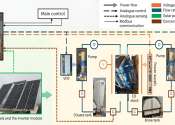Researchers create smaller, cheaper flow batteries for clean energy
Clean energy is the leading solution for climate change. But solar and wind power are inconsistent at producing enough energy for a reliable power grid. Alternatively, lithium-ion batteries can store energy but are a limited ...
Jan 13, 2023
1
68









